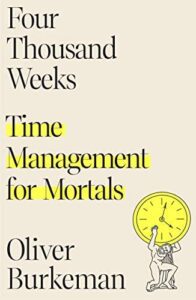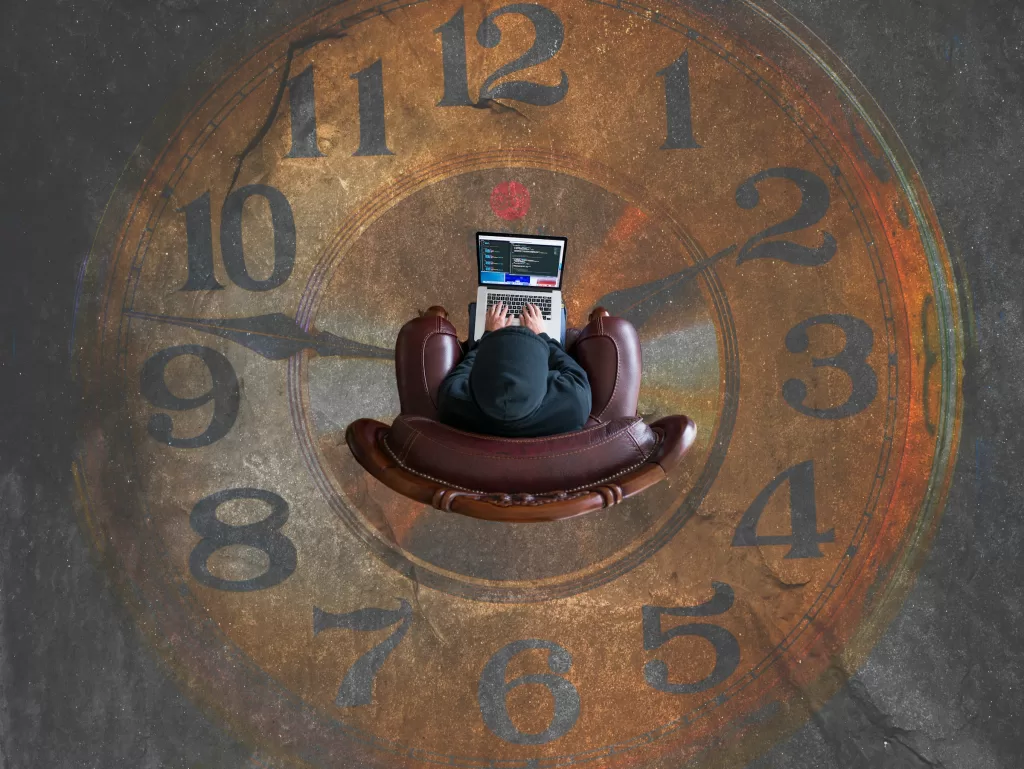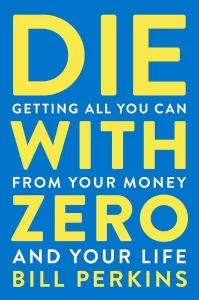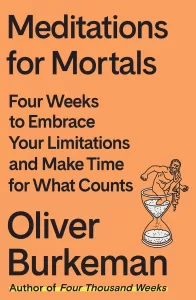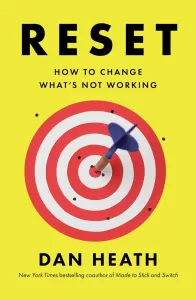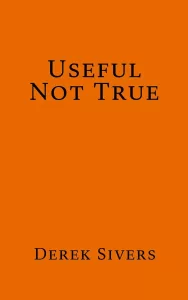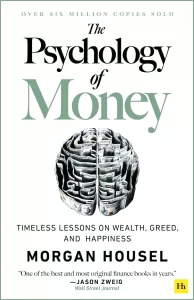Book Review: “Four Thousand Weeks”
Book: Four Thousand Weeks by Oliver Burkeman
Reviewer: Bobby Powers
My Thoughts: 9 of 10
I opened this book expecting a standard time management book about how to hustle and get more out of every second. Instead, Burkeman gave me a pleasant surprise: a philosophical, practical, and timely book that encouraged me to question whether I'm using my life to work on the most important things. Each of us will live about 4,000 weeks. How will you use them?
What I Learned from the Book
We tend to focus on the wrong things. We're obsessed with efficiency and time management while we lose sight of effectiveness and meaning. Most people would prefer to cross 100 insignificant things off their checklist rather than accomplish one meaningful project. Why? Because we've bought into the idea that busyness is productivity. It feels good to cross tasks off a list, but it's more important for us to ask, "Why am I here? What do I want to do with my life? And how can I start making progress on that today?"
Selected Quotes & Ideas from the Book
Putting Your Life in Perspective
- "The average human lifespan is absurdly, terrifyingly, insultingly short...Assuming you live to be eighty, you'll have had about four thousand weeks."
- "We've been granted the mental capacities to make almost infinitely ambitious plans, yet practically no time at all to put them into action."
- "It follows from this that time management, broadly defined, should be everyone's chief concern. Arguably, time management is all life is. Yet the modern discipline known as time management—like its hipper cousin, productivity—is a depressingly narrow-minded affair, focused on how to crank through as many work tasks as possible, or on devising the perfect morning routine, or on cooking all your dinners for the week in one big batch on Sundays. These things matter to some extent, no doubt. But they're hardly all that matters."
- "The problem isn't exactly that these techniques and products don't work. It's that they do work—in the sense that you'll get more done, race to more meetings, ferry your kids to more after-school activities, generate more profit for your employer—and yet, paradoxically, you only feel busier, more anxious, and somehow emptier as a result."
The Pursuit of Leisure and Meaning
- "None of this is how the future was supposed to feel. In 1930, in a speech titled 'Economica Possibilities for Our Grandchildren,' the economist John Maynard Keynes made a famous prediction: Within a century, thanks to the growth of wealth and the advance of technology, no one would have to work more than about fifteen hours a week. The challenge would how to fill all our newfound leisure time without going crazy...But Keynes was wrong. It turns out that when people make enough money to meet their needs, they just find new things to need and new lifestyles to aspire to."
- "To the philosophers of the ancient world, leisure wasn't the means to some other end; on the contrary, it was the end to which everything else worth doing was a means."
- "The Latin word for business, negotium, translates literally as 'not-leisure,' reflecting the view that work was a deviation from the highest human calling."
- "This same essential idea remained intact across centuries of subsequent historical upheaval: that leisure was life's center of gravity, the default state to which work was a sometimes inevitable interruption."
- "But industrialization, catalyzed by the spread of the clock-time mentality, swept all that away...But at the same time, a new hierarchy had been established. Work, now, demanded to be seen as the real point of existence; leisure was merely an opportunity for recovery and replenishment, for the purposes of further work."
Embrace the Idea That You Don't Have Time for Everything
- "The more you try to manage your time with the goal of achieving a feeling of total control, and freedom from the inevitable constraints of being human, the more stressful, empty, and frustrating life gets."
- "In practical terms, a limit-embracing attitude to time means organizing your days with the understanding that you definitely won't have time for everything you want to do, or that other people want you to do—and so, at the very least, you can stop beating yourself up for failing. Since hard choices are unavoidable, what matters is learning to make them consciously, deciding what to focus on and what to neglect, rather than letting them get made by default—or by deceiving yourself that, with enough hard work and the right time management tricks, you might not have to make them at all."
- "So, technically, it's irrational to feel troubled by an overwhelming to-do list. You'll do what you can, you won't do what you can't, and the tyrannical inner voice insisting that you must do everything is simply mistaken."
- "But the other exasperating issue is that if you succeed in fitting more in, you'll find the goalposts start to shift: more things will begin to seem important, meaningful, or obligatory. Acquire a reputation for doing your work at amazing speed, and you'll be given more of it."
- "Think of it as 'existential overwhelm': the modern world provides an inexhaustible supply of things that seem worth doing, and so there arises an inevitable and unbridgeable gap between what you'd ideally like to do and what you actually can do."
- "It's only by facing our finitude that we can step into a truly authentic relationship with life."
- "It is by consciously confronting the certainty of death, and what follows from the certainty of death, that we finally become truly present for our lives."
- "The real measure of any time management technique is whether or not it helps you neglect the right things."
- "You need to learn how to start saying no to things you do want to do, with the recognition that you have only one life." -Elizabeth Gilbert
Attention and Distraction
- "What you pay attention to will define, for you, what reality is."
- "At the end of your life, looking back, whatever compelled your attention from moment to moment is simply what your life will have been. So when you pay attention to something you don't especially value, it's not an exaggeration to say that you're paying with your life."
- "But the crucial point isn't that it's wrong to choose to spend your time relaxing, whether at the beach or on BuzzFeed. It's that the distracted person isn't really choosing at all. Their attention has been commandeered by forces that don't have their highest interests at heart."
- Today's "Attention Economy" is "essentially a giant machine for persuading you to make the wrong choices about what to do with your attention, and therefore with your finite life, by getting you to care about things you didn't want to care about."
- "All the feuds and fake news and public shamings on social media, therefore, aren't a flaw, from the perspective of the platform owners; they're an integral part of the business model."
- "Something in us wants to be distracted, whether by our digital devices or anything else—to not spend our lives on what we thought we cared about the most."
Radical Incrementalism
- "If you don't save a bit of your time for you, now, out of every week, there is no moment in the future when you'll magically be done with everything and have loads of free time." -Jessica Abel
- "If you plan to spend some of your four thousand weeks doing what matters most to you, then at some point, you're just going to have to start doing it."
- "You'll probably never get to a point where you feel you have things in perfect working order. And that therefore you had better stop postponing the 'real meaning' of your existence into the future, and throw yourself into life now."
- "The psychology professor Robert Boice spent his career studying the writing habits of his fellow academics, reaching the conclusion that the most productive and successful among them generally made writing a smaller part of their daily routine than the others, so that it was much more feasible to keep going with it day after day. They cultivated the patience to tolerate the fact that they probably wouldn't be producing very much on any individual day, with the result that they produced much more over the long term. They wrote in brief daily sessions—sometimes as short as ten minutes, and never longer than four hours—and they religiously took weekends off."
- "One critical aspect of the radical incrementalist approach, which runs counter to much mainstream advice on productivity, is thus to be willing to stop when your daily time is up, even when you're bursting with energy and feel as though you could get much more done."
- "Stopping helps strengthen the muscle of patience that will permit you to return to the project again and again, and thus to sustain your productivity over an entire career."
5 Questions to Reflect Upon
- Where in your life or your work are you currently pursuing comfort, when what's called for is a little discomfort?
- Are you holding yourself to, and judging yourself by, standards of productivity or performance that are impossible to meet?
- In what ways have you yet to accept the fact that you are who you are, not the person you think you ought to be?
- In which areas of life are you still holding back until you feel like you know what you're doing?
- How would you spend your days differently if you didn't care so much about seeing your actions reach fruition?
Tools for Embracing Your Finitude
- "Establish predetermined time boundaries for your daily work."
- "Focus on one big project at a time (or at most, one work project and one nonwork project) and see it to completion before moving on to what's next."
- "Decide in advance what to fail at. You'll inevitably end up underachieving at something, simply because your time and energy are finite. But the great benefit of strategic underachievement—that is, nominating in advance whole areas of life in which you won't expect excellence of yourself—is that you focus that time and energy more effectively."
- "Consciously pick your battles in charity, activism, and politics...to make a difference, you must focus your finite capacity for care."
- "Whenever a generous impulse arises in your mind—to give money, check in on a friend, send an email praising someone's work—act on the impulse right away, rather than putting it off until later." (Idea from Joseph Goldstein)
